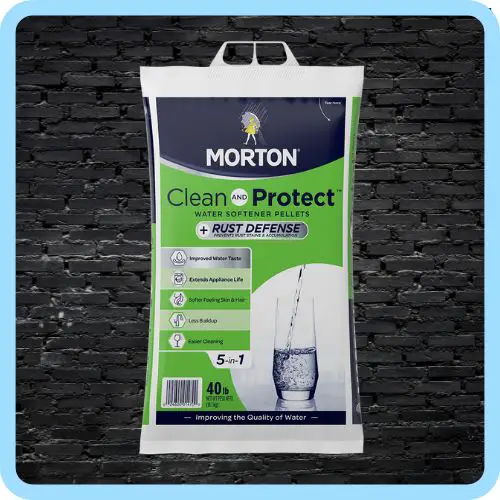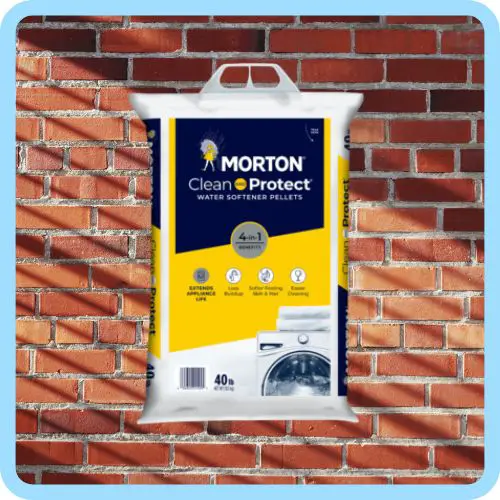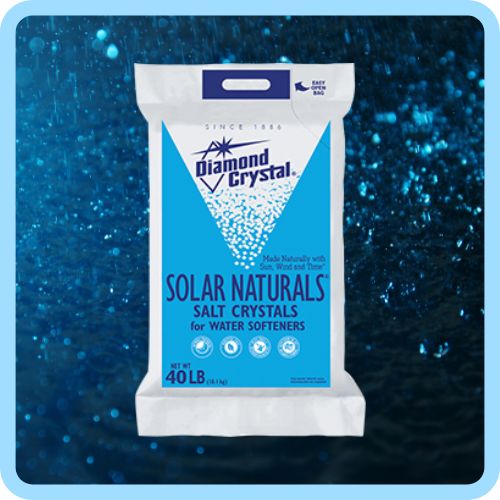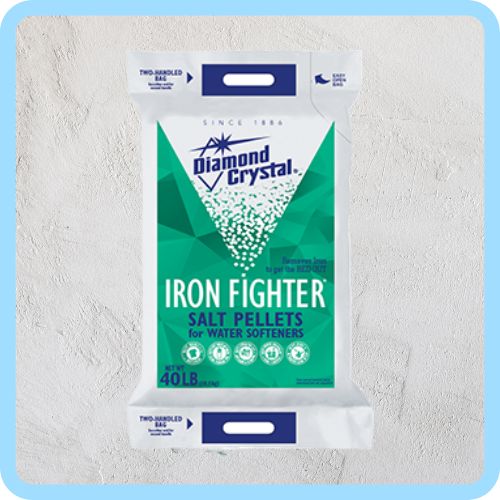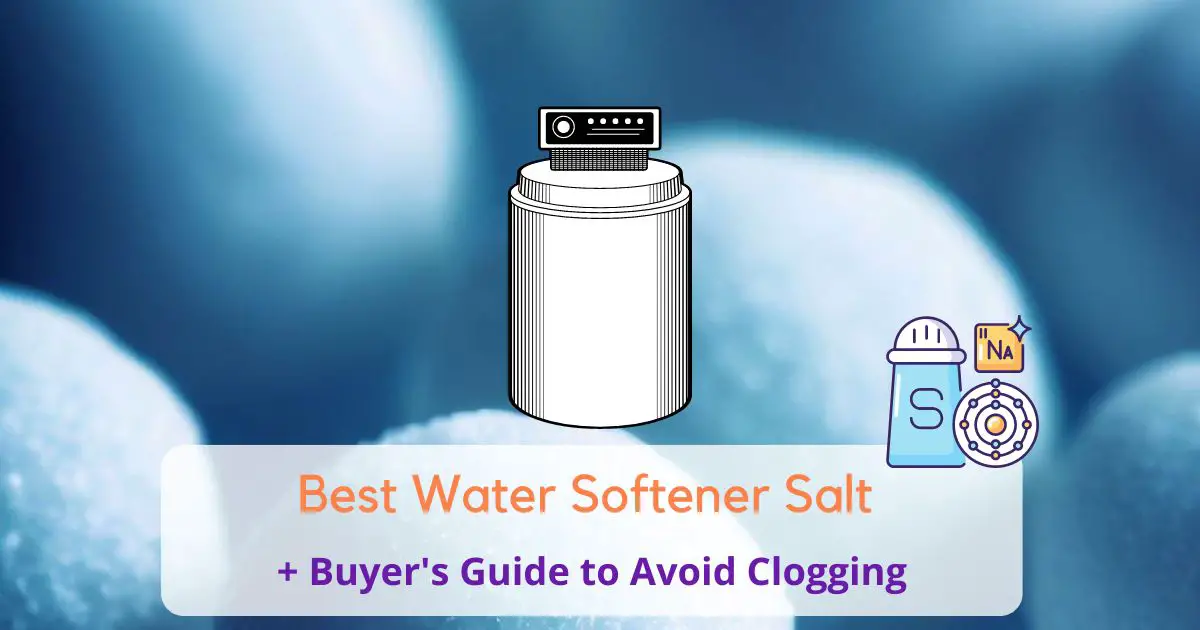
Choosing the right water softener salt can be the difference between fantastic-tasting water and scale-free pipes or constant maintenance of your softener and regular descaling of your appliances.
We reviewed five of the most popular softener salts, looking at their price, effectiveness, shape, and what kind of salt they’re made from.
The best water softener salt for iron removal is Morton Clean & Protect Rust Defence if you have iron in your water, if not, then regular Morton Clean & Protect is the one to go for. It’s effective and economical, and you can buy in bulk to save more. It’s also readily available in stores, so you won’t need to search for it.
Best Water Softener Salt – Our Top 5
- Morton Clean & Protect Rust Defense – Best for iron removal >> See Review
- Morton Clean & Protect – Best for water without iron >> See Review
- Diamond Crystal Solar Naturals – Best solar salt >> See Review
- Diamond Crystal Iron Fighter – Alternative pick for water with iron >> See Review
- Diamond Crystal Bright & Soft – Alternative pick for water without iron >> See Review
Why we don’t recommend crystal salt, rock salt, or potassium chloride
Generally, avoid using crystal salt, rock salt, or potassium chloride in your water softener system.
These products are often made up of larger pieces that can clog the system and cause dirt and impurities to settle on the tank’s floor. Over time, this can wear down your system and lead to early replacement or maintenance.
Sodium chloride is typically the best choice for consistent and reliable results.
While some people prefer potassium chloride, it may require adjustments to the system settings and regeneration frequency [1], so check with your dealer first.
A “salt bridge” is another issue that can occur when using non-sodium chloride products, forming a barrier that prevents clean water from entering your home.
To avoid problems, stick with sodium chloride for your water softener system unless you have a specific reason to use something else.
The Best Water Softener Salt: 5 Types Reviewed
Instead of needing to read through dozens of different water softener products and compare them all yourself, I’ve done all the hard work for you.
Below are the top five salt options for your water softener and what makes each unique.
Morton Clean & Protect Rust Defense
Best for water with iron
- Type: Sodium Chloride
- Form: Pellets
- Bag size: 40lbs
- Avg. usage: 2 bags every two months
- Price: $$
Removing more than ten times the amount of iron than average salt, Morton Clean & Protect Rust Defense will do a great job keeping your home rust-free and your water tasting good.
After a few days, I noticed an improvement in stains on my toilets.
The 40lb bag might be heavy to carry, but the easy-to-carry handle built into it helps you transport it anywhere.
Since these salt pellets remove as much as ten times the amount of iron as regular salt, you can expect an improved taste in your water. Sensitive palates might notice an improvement in the taste of their drinking water, but the entire household will see a softer feel on the skin and hair.
Households that have noticed brown-red stains forming on appliances can improve their water quality by using Morton Clean & Protect Rust Defense.
Morton Clean & Protect
Best for water without iron
- Type: Sodium Chloride
- Form: Pellets
- Bag size: 40lbs
- Avg. usage: 2 bags every 2 months
- Price: $$
For homes that want to use high-quality salt for their softeners but don’t have a lot of iron in their water, Morton Clean & Protect is an effective solution.
You’ll get the same easy-to-carry handles built into the bag, so hauling the 40lb bag won’t be an issue. In fact, by buying from Amazon, you’ll get three bags with every order when choosing this option, so having an easy way to carry them will come in handy.
A large amount of Morton salt means you’ll be stocked in your home for a few months. Although this formula doesn’t focus on getting rid of as much Iron as the other Morton option on this list, you’ll still remove a good amount of impurities to make your water safer and cleaner.
The salt comes in pellets that will protect your softener from getting clogged like rock salts or crystal salts. This formula of Morton’s is the least expensive on the list, so it’s perfect for homes that need softer water but don’t have a significant iron problem.
Diamond Crystal Solar Naturals
Best solar salt
- Type: Sodium Chloride
- Form: Crystals
- Bag size: 40lbs
- Avg. usage: 2 bags every 2 months
- Price: $$$
Diamond Crystal Solar Naturals gets its name because of the method by which they extract the salt. Using the sun’s natural rays, shallow pools of water are exposed to the heat, and as the water evaporates, small natural salt crystals are left behind.
The result is 99.6% pure Diamond Crystal and the small salt crystals will help keep your water much softer during showers or while washing your hands.
While other crystals might use harsh chemicals to fight the impurities in your water, Diamond Crystal is all-natural. The smaller sizes even prevent it from building up in your water and leaving residue.
Instead of a plastic handle added to the top of the bag, like with Morton, Diamond chooses a punchout hole in the top of the bag you can stick your fingers through.
Households that want a natural product that still gets the job done should use Solar Naturals.
Diamond Crystal Iron Fighter
Alt. Pick for Water with Iron
- Type: Sodium Chloride
- Form: Pellets
- Bag size: 40lbs
- Avg. usage: 2 bags every 2 months
- Price: $$$
A true competitor to the rust-free salt made by Morton, the Diamond Crystal Iron Fighter salt pellets are made to remove the iron content from your water and soften the water from other impurities.
The pellet size makes it easier to use consistently without worrying about a clog in your system. You also won’t have to worry as much about residue building up in your pipes over time.
Like other Diamond bags, you’ll have a punchout hole at the top you can place your finger through for holding. Unlike other bags, the Diamond Crystal Iron Fighter has another punchout hole at the bottom for more stability when holding.
In addition to removing iron from your water, you’ll also notice a difference in how the water feels on your skin and hair. Homes with water that taste funky or have seen stains on the toilets should start using Iron Fighter.
Diamond Crystal Bright & Soft
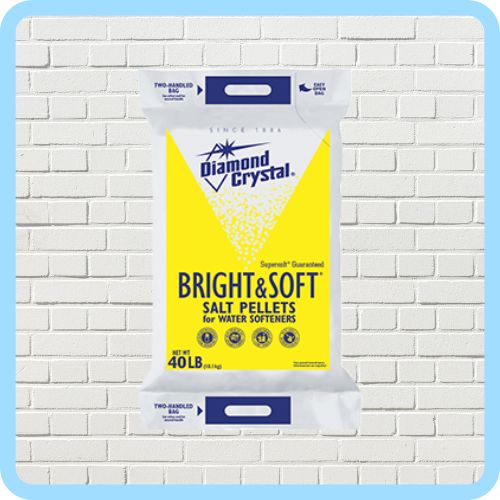
Alternative Pick for Water without Iron
- Type: Sodium Chloride
- Form: Pellets
- Bag size: 50lbs
- Avg. usage: 2 bags every 2 months
- Price: $$
With an impressive 99.8% purity, Diamond Crystal Bright & Soft salt contains most minerals like barium, calcium, and magnesium from your water. That means you won’t have bad taste in your mouth after drinking tap water, and you won’t have to worry about a build-up of minerals causing damage to your pipes.
The bag uses the same two-handle support when carrying as the Iron Fighter. You can lug it around easily to and from your water softener.
You’ll get 40 lbs of salt in one bag, but since the formula has extra purity, your water should be even softer than regular salt. Homeowners who appreciate soft water when running laundry or want soft water for a shower should consider the Diamond Crystal Bright & Soft.
Buyer’s Guide: How to choose the best water softener salt
Choosing the right salt for your water softener goes beyond comparing one bag to another.
Here are the top considerations to consider when shopping for different water softener salts.
Check your manual: Which type of softener do you have?
Water softener systems are sensitive and require you to use the correct type of salt.
You should always consult your manual first to check which type of salt you need for your system. The manual is the primary source of information about what is best for your water softener. Reading tips from other sources can be helpful in a pinch, but a manual is precise in its recommendations.
Some tanks may require pellets to prevent clogging the small openings in your tank, while others may require potassium chloride. Putting in the wrong type of salt can damage and ruin your entire system. You might even be able to use it at first, but over time the buildup of the wrong type of salt will clog and cause maintenance issues for your softener.
Are you taste-sensitive or do you have dietary requirements?
Consider your tastes and dietary requirements when selecting the right salt for a water softener because the salt used in the softening process can affect the taste and quality of the water.
If you notice your water tastes salty, one option is to use a potassium chloride salt instead of sodium chloride. Potassium chloride doesn’t contain sodium, and it won’t cause the water to taste salty [2]. Another option is to use a water filter to remove the sodium from the softened water.
Choosing a low-sodium option may be best if you or someone in your household is restricted from sodium intake [3]. That’s when using a potassium chloride option for your water softener is helpful.
Do you have iron?
Have you noticed any red stains in your toilets or clothes washer? Do you detect a distinct taste in your water compared to your friend’s house?
If so, this could indicate that you have iron in your home’s water. If that is the case, the type of salt you use in your water softener can eliminate the iron.
There are two primary types of salt for water softeners: those with a specific formula designed to remove iron and those that eliminate common minerals and impurities without iron. You’ll pay a little more for the iron removal formula.
If you observe a large amount of iron in your water and you’re using a water softener for well water, then you should use one of the specialized formulas specifically created to remove this mineral.
Otherwise, you can stick with the regular formula, which concentrates on minerals such as magnesium and barium.
Budget & ongong costs
If you head to the store and pick up a few bags from your local home improvement store, you’ll have to lug around 40 and 50-lb bags and unload them into your home. For the convenience of having them shipped right to your door, you will pay a premium in shipping.
Make sure you factor in the cost of shipping your bags when choosing between types and also the ongoing costs. You will have to continue to order more bags as time goes on, and the price can become high for the premium-quality options.
Buy in bulk to save $$$
The benefit of online buying is that you can buy in bulk and don’t have to do any heavy lifting.
Even though the price per bag is higher, the actual cost you are saving is physical labor. Online buying is the best option for those who need help lifting and carrying heavy bags. You could buy in bulk, too if that is the case. That way, you’ll only have to deal with one order every few months instead of constantly handling salt bags to your home.
To save on hassle and physical labor, it’s best to buy your salt bags in bulk and only manage them once every few months. This strategy also works to help protect you from market fluctuations.
If the seller has a hard time getting bags to you or there is a delay in shipping, your home can remain just how it is because of your backup of salt bags.
Water Softener Salt: A quick guide
To effectively use salt in your water softener, you must understand how it works in your tank and when to replace it. You’ll also need to identify the types available and any maintenance required.
How does it work, and why do you need to replace it?
Salt works in a water softener by replacing hardness minerals, such as calcium and magnesium ions, with sodium ions. The process is called ion exchange. When hard water enters the brine tank, it comes into contact with the salt and starts the ion exchange process [4].
It’s important to note that using table salt will not have the same effect on your water. You need a type of salt specifically for a water softener’s brine tank.
However, there are salt-based water softeners and salt-free water softeners. The latter can use a potassium chloride water softener to clear the impurities and hard minerals in your water.
Types of Water Softener Salts
Below is a breakdown of the different types of water softener salts available to use and the unique differences between each one. Use this breakdown to understand which options will work best for your home and your softener system.
Crystals & Evaporated Salt Pellets
Two of the most common forms of water softener salt are crystals and evaporated salt pellets.
Evaporated salt pellets are the highest-quality and highest-purity salt, while crystals are a lower-quality option that can cause salt bridging.
Evaporated salt pellets are small enough to dissolve quickly into your water without causing any buildup or residue. You won’t have to worry about salt bridging when the salt forms a hard clump that prevents water from entering your brine tank.
Crystals are much more prone to clogging and bridging.
Sodium chloride & potassium chloride
Potassium chloride and sodium chloride are alternatives to choosing a pure salt option for your softener. Sodium chloride is one of the least expensive options on the list and is perfect for budget homeowners. They’ll still soften your water, but you don’t have to spend as much on them.
Potassium chloride is a solution for those that need to reduce their sodium intake. Since potassium chloride has no sodium, it’s perfect for a low-sodium diet. The only issue is that potassium chloride costs significantly more than sodium chloride and you’ll also have to add a lot more to get the same results.
A better option for people who want to reduce sodium is to look for a salt-free water softener instead.
Solar Salt & Rock Salt
Solar salt and rock salt are fairly different in how they are extracted. Solar salt is a natural process in which the salt is extracted from salt ponds. Small shallow pools are created to store the water and once it evaporates, the salt is left behind. It’s then collected to be used for a variety of purposes.
Rock salt, on the other hand, is mined from underground deposits of salt that are often thousands of years old. It’s a very inexpensive option but that’s because it doesn’t have the effectiveness of other types. One of the main complaints is that it can contain deposits like calcium sulfate, preventing the salt from dissolving effectively.
How to know if your softener salt needs topping up
The easiest way to do this is by lifting your brine tank top and looking inside. If the salt is looking dry or less than halfway full, it’s time to give it a top-off.
Most softener models these days will also have an indicator. This will save you from looking inside.
It’s a myth that you will notice a change in your water’s taste or how your soap lathers. This just isn’t a reliable indicator for most people,
How to add salt to your water softener
To add salt to a water softener, follow the below steps. We advise wearing gloves and generally being very careful when handling water softener salt.
- Locate the brine tank: The brine tank is typically located near the water softener unit and is where you will add the salt.
- Turn off the water supply: Before adding salt, turn off the water supply to the softener so that no water enters the tank during the filling process.
- Remove the lid from the brine tank: Most brine tanks have a removable cover that can be lifted off easily.
- Check for any debris or buildup: Before adding new salt, check for any debris or buildup at the bottom of the tank, and remove it if necessary.
- Add new salt: Slowly pour in new salt into the brine tank until it reaches about 2/3 full. Be sure not to overfill as this can cause clogging or bridging problems.
- Replace the lid on top of the brine tank and ensure that it is securely in place.
- Turn on power and initiate regeneration cycle: After adding new salt, turn on power to your water softener unit and allow it to run through a regeneration cycle before using any water again.
By following these steps regularly, you can ensure that your water softener continues to operate effectively and efficiently by keeping its salt level filled up.
Clogging, bridging, and other problems
Clogging, bridging, and other problems may arise over time if you use the incorrect salt in your system. For instance, the salt may not dissolve entirely, causing your water softener components to clog.
Additionally, a hard salt crust may form at the bottom of the tank, known as ‘bridging,’ which occurs when salt particles clump together and create a solid-like mass that restricts water flow into the tank, causing your system to stop working.
Other issues that may occur in your home include clogged pipes, unpleasant-tasting water, and difficulty washing away soap and hair products during showers. To prevent these issues, it’s crucial to utilize a high-quality salt that is specifically designed for your water softener.
Conclusion
The right water softener salt will help your water taste better, remove iron if needed, and protect your home appliances.
The best water softener salt overall is Morton Clean & Protect. It removes most hard minerals in your water and comes in bulk so you don’t have to deal with the hassle of carrying around a heavy bag every single month.
If buying salt seems like too much hassle, you could also consider checking out our list of the best electronic descalers – no maintenance needed!

